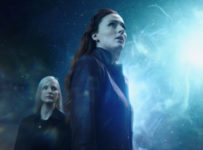
Welcome to the Space Show showed at the Sydney Film Festival before it saw its wide release in Japan. It is an impressive piece of science fiction work, albeit not the same film that I was expecting from the synopsis provided by the program (but then, is a film ever the same as its listing?), and one that is perhaps overloaded with ideas towards the end, but I came out of it glad for having seen it.
A group of students in a country town prepare to spend a week camping out in their school grounds. They tend to a wounded dog, only to find that he’s actually Pochi, an alien doing research on Earth plants. To thank them for saving his life, Pochi takes them to the “other side” of the Moon, but due to complications in customs all travel back to Earth is suspended, and the band have to take the long way around…
Welcome to the Space Show is a very busy film, but the introduction would not have you suspect that: after a frenetic and contextless battle prologue, it begins as a small town character piece about just about any summer holiday you could imagine. It's small scale, it's slow, and it's subtle. There's no sense of urgency, and if you hadn't seen a red suited flash of light burning up a field there would be no indication that it would transform into a space travelogue and, later, into a ridiculously but enjoyably overblown space opera.
Welcome to the Space Show takes a lot of standards and treats them in a mostly enjoyable way. The story is familiar in many ways, part alternate dimension student quest, part friendship and self realisation journey, part travelogue and partly reminiscent of countless Atlantis/Babel fables. All of these elements are positive things, but towards the end one can’t help but feel the film has been at least slightly overlarded with ideas, especially those that appear at the eleventh hour. Many seeds are planted and they all come to fruition, but they are not all equally well presented.
Welcome to the Space Show, apart from its unwieldy and arbitrary title, would perhaps be better served as a 13 or 26 episode series. It feels suitably epic and well developed enough that I got emotional at the end, but the hi-falutin philosophies of interventionist policy versus self determinism seem kind of shoehorned in so that a character piece can suddenly feature action that it hasn’t strictly needed for the rest of the film.
Similarly, the relationship between the two female leads is inconsistently fraught: they cooperate most of the time but they have a rift that was caused before the film started that only occasionally causes trouble between them. Of course, it comes to a head just as there is a shift in the drama so that everyone can team up and be grand. It’s more than a little arbitrary but everything serves a higher purpose: to make the audience get teary about the adventures of a talking dog alien and his school chums.
Story, character and emotion aside, Welcome to the Space Show is worth noting for its visual splendour. The character designs are all fairly standard issue for a Masunari lead production, which is to say attractive and unchallenging. Some of the aliens look distinctly weird, but that's the point: the scenery and the alien design make the film visually busy, more packed even than ultimately the fit-to-burst plotline. There are so many things to see, and so many things to think you saw. I could have sworn that I saw R2-D2 in the background of the alien nursery, but I could have been entirely wrong. It's little details like this that make Welcome to the Space Show so tantalising a prospect to rewatch. At times it feels visually, if not tonally, like Spirited Away in space. There is so much going on and so much to see at all times that there is probably no physical way to catch it all in one viewing. At the same time, all of the most pertinent information is effortlessly communicated and the characters and story are never compromised for cheap spectacle or an in-joke. It's a delicate balancing act, but a winning one. The visual direction of Welcome to the Space Show alone makes it worth watching, and works wonders towards tying together the sometimes disparate plot threads.
Welcome to the Space Show was fairly delightful to watch, which is not to say that it was flawless. Its format may have been slightly better suited to something other than the perhaps too densely packed movie that it became, but it did a good job of establishing a universe and characters. Screenwriter Kurata Hideyuki has here engaged in some slightly more heavy-handed didacticism than is usual, but Welcome to the Space Show is definitely a movie that I would happily watch again.

